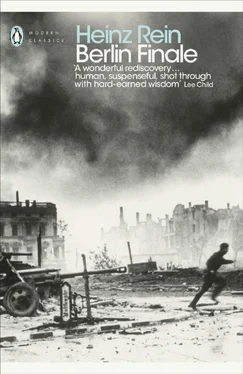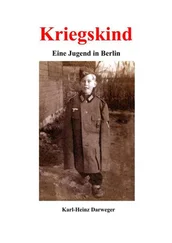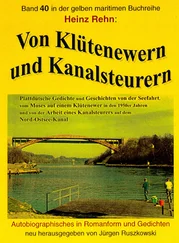Lassehn reaches for the revolver in his trouser pocket, he wants to have the gun ready to fire in any eventuality. As he stays in his half-reclining position, every muscle in him tenses as he contemplates the possibility of flight.
‘What right do you have to ask me that?’ he asks.
‘I’m the air-raid warden for this building,’ the man replies.
‘Very interesting,’ Lassehn says casually. ‘I don’t care, as far as I’m concerned you can stay that way.’
A vein stands out thick and red on the man’s forehead, but he manages to contain himself. ‘I am responsible for the safety of the shelter,’ he says, ‘and I am also the Party Block Warden. So, who are you?’
‘My name is Kempner,’ Lassehn says now. ‘Is that enough for you?’
The man ignores the question. ‘I want to see your papers,’ he demands.
‘I haven’t got any,’ Lassehn says, ‘I lost all my papers when I was escaping.’
‘When you fled?’ the air-raid warden asks in surprise. ‘Who were you fleeing?’
‘The Russians, of course,’ Lassehn says, and tries to look nonchalant. ‘Had to leave everything at home, the whole place was topsy-turvy.’
The man gives him a penetrating look. ‘Where from?’ he asks curtly.
‘From Neumark,’ Lassehn says, ‘between Soldin and Lippehne.’
‘And no papers?’ the man persists. ‘People always have papers.’
‘Not always,’ Lassehn disagrees, ‘if you’re working in the fields…’
The man shuts his eyes tight, you can tell that behind his forehead the thoughts are chasing after one another. ‘Since when have you been travelling?’
Lassehn rocks his head back and forth. ‘Well, for fourteen days, perhaps three weeks,’ he replies. Why is he asking all these questions?, he thinks.
‘Listen, there’s something wrong here,’ the warden says after a short pause.
Have I given myself away? Lassehn wonders. It all sounds quite credible, I could really believe that this is what happened. ‘What seems to be wrong?’ he asks, and measures the distance to the cellar exit with his eyes.
‘You said you’d been working in the fields,’ the other man says, ‘when you suddenly had to leave.’
‘That’s right,’ Lassehn replies. ‘And why…’
‘You were working in the fields in the middle of March?’ the man asks again. ‘In snow and ice? Were you picking potatoes or harvesting carrots? You don’t even believe that yourself.’
Lassehn gives a start, he can see that his excuse was a serious mistake, the thoughts in his head begin circling unbearably, it’s as if someone were slowly lifting off the lid of his skull.
The man walks right up to Lassehn. ‘What’s up now?’ he asks menacingly. ‘Either you identify yourself, or you come straight the station after the all-clear. Meanwhile you’ll sit here quietly.’
‘Out of the question!’ Lassehn says and slowly stands up, taking the safety catch off the revolver in his trouser pocket. ‘You haven’t the right…’
‘Don’t be impertinent!’ says the man. ‘Haven’t the right? Everyone these days has the right to arrest suspicious people. Haven’t you heard of deserters, spies and foreign agents? And in any case, this is ID enough!’ And he points at his Party insignia.
‘That is…’ Lassehn is about to object, he is about to say that even an insignia isn’t a form of legitimation.
‘What’s going on here?’ a woman’s voice says. Mrs Buschkamp has joined them, and grasped the situation with a glance.
‘What do you want with my nephew, Mr Exner?’
The air-raid warden turns round hastily. ‘Is this your nephew, Mrs Buschkamp?’ he asks in astonishment.
‘What else?’ says Mrs Buschkamp. ‘Turned up yesterday, the lad’s half dead, leave him in peace.’
Lassehn responds to the concierge’s intervention first with astonishment, then with relief. Even though he doesn’t know what has prompted her to do this, he is still grateful to her for helping him out of his precarious situation. Once he has reached the cellar steps he is no longer afraid, but inside the shelter, where outstretched legs, prams, suitcases and electric ovens are ready to impede one’s flight, it’s dangerous.
‘Why didn’t you say straight away that he was your nephew?’ the man asks.
‘You didn’t ask,’ Lassehn replies, and slips back into the resting position. If the situation has relaxed a little, he still has to be on his guard, as his suddenly acquired nephew status presents him with new problems that he will have to solve carefully, as general attention is focused on him and the Block Warden’s suspicion has only been distracted, not entirely dispelled.
‘Go on sleeping,’ Mrs Buschkamp says to Lassehn, ‘you must be exhausted.’
‘Are you assuming responsibility for the young man?’ Exner says.
‘Course I will,’ says Mrs Buschkamp. ‘Now clear off, it’ll be the all-clear soon, and he’ll be able to go back to bed.’
‘Doesn’t look that way,’ says another man coming down the narrow passageway, ‘all kinds of formations are headed this way.’
Exner turns towards the speaker. ‘Where are they coming in from?’ he asks. The expression on his face has changed very quickly, the menace that leaped from his eyes and caused his chin to jut are being replaced by fear that makes his cheeks quiver and casts a dark shadow into his eyes.
‘From Potsdam and Luckenwalde,’ the other man replies, ‘they’re probably flying in from the south and south-west.’
‘Let’s listen to the police radio station,’ Exner says.
They both leave, and Lassehn is no longer the focus of interest, the other waves of American bombers overshadow his insignificant little person. He puts the catch on his revolver and pushes it back into the depths of his trouser pocket.
‘Mrs Buschkamp,’ he says quietly and looks gratefully at the old woman, ‘thank you…’
Mrs Buschkamp makes a quick, defensive movement with her hand. ‘Daft sod,’ she says loudly, ‘what were you doing annoying Mr Exner?’
‘But…’ Lassehn says, trying to defend himself.
‘Shut up,’ Mrs Buschkamp snaps at him. ‘Are you trying to cause your old aunt problems?’
Lassehn smiles and nods, he understands at last that Mrs Buschkamp is a new aunt for him, and that for her this new relationship is not without its dangers, a single false note could place not just him but also this old lady in very great danger. He is in no doubt that the scene has etched itself on the consciousness of the assembled residents of the house, and will be the sole topic of conversation once the daylight raid is past. He watches after the old woman, who is now returning to her place by the entrance that links the two cellars, she sits down, takes a pair of glasses from her coat pocket and starts reading a battered book. What moved this woman, a stranger, to speak up on his behalf, putting herself in danger that could become acute at any moment and whose consequences are unpredictable? What made her do that? Pity? Kindness?
Lassehn is inclined always to assign all that is good in people to their emotional components, to explain it with reference to the innate goodness of the human psyche, he doesn’t know, or it has not revealed itself to him sufficiently clearly for him to recognize it, that impulses like pity, helpfulness and loyalty can also spring from a particular set of convictions. Nationalism has stripped many words of their noble content, so that even the notion of convictions still has a whiff of National Socialism about it. Lassehn has known since yesterday that there are certain sets of convictions which National Socialism has not been able to eradicate, and which it has not been able to distort even with the most skilful turns of phrase, but he does not suspect this feisty old woman, with her slightly pinched eyes and her quick Berlin tongue, of having them.
Читать дальше












